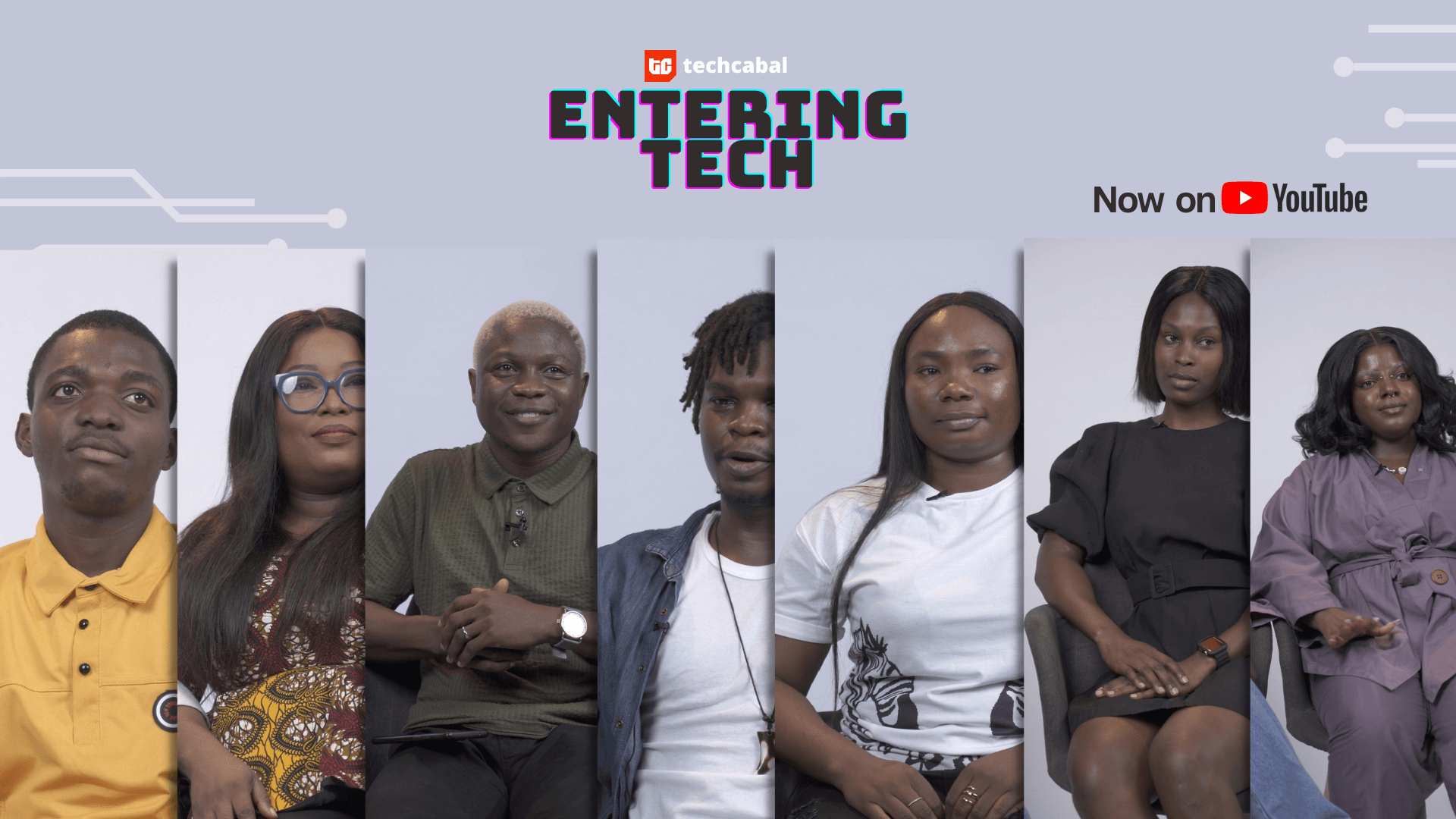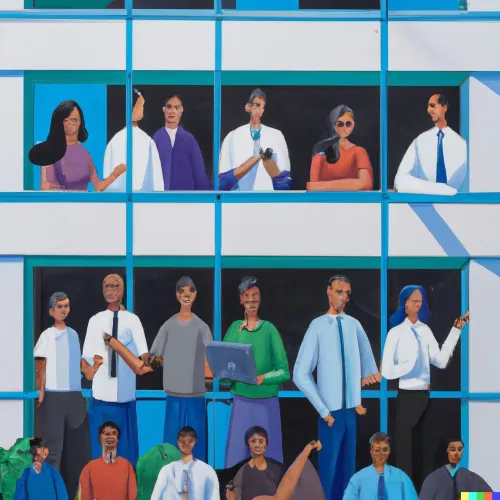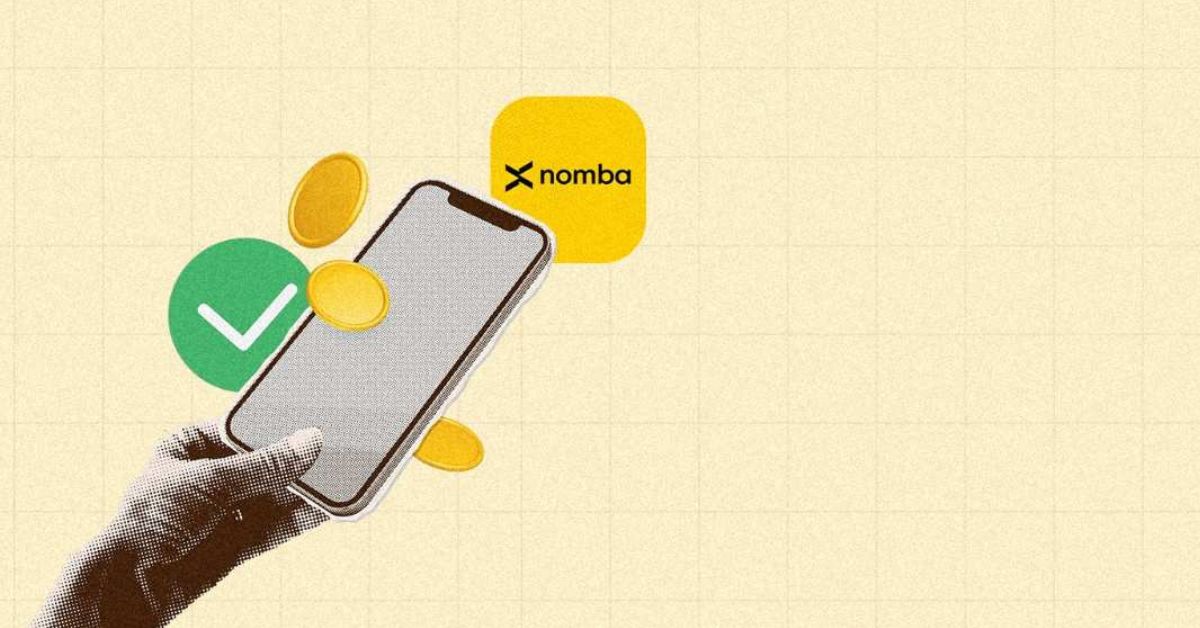
27 || April || 2023
View in BrowserBrought to you by

#Issue 28
How we think about balance and ethic
Greetings, ET readers 🖖🏾
Since we launched #EnteringTech🚀 in September 2022, we’ve grown this newsletter to 40,000 subscribers across 10+ countries who are interested in becoming techies.
The newsletter has received a lot of love since launch, like this reader who calls it the “gift that keeps giving.”
Well, we’re giving more! We are super excited to announce a new video series to help young people not just navigate the tech world but pursue a career that can be fruitful and satisfying.

If you’ve loved reading #EnteringTech🚀, you’ll definitely enjoy watching it more. Every Wednesday, we’ll share 60-second clips of professionals who will help you understand tech careers.
Ready? Watch the first episode here.
by Pamela Tetteh and Timi Odueso.

Tech trivia
Here is this week’s trivia. Answer is at the bottom of this newsletter.
- How many hours, on average, does a person spend at work during their lifetime? (It’s not as much as you think it is!)

Work ethic v Work-life balance
Earlier this week, DAI Country Director Joe Abah made a questionable tweet that reignited a recurring conversation.
In a tweet that now has 1.2 million views, Abah wrote, “Gen Z people were asking a Chief Executive of a large multinational his views on work/life balance. He said: “I didn’t become Chief Executive by work/life balance. I became Chief Executive by work ethic.” The room fell silent. What do Gen Z people think?”
💡 Work ethic is a set of principles that guide how people do their work, and how organisations run in general. Examples can include a culture of being at meetings 5 minutes early or even always missing deadlines. Just as there’s no one winner in the Senegal v Nigeria v Ghana jollof war, there’s no single definition for work-life balance. However, it’s generally understood as the ways individuals balance their work lives and their personal lives. We spend ⅓ of our lives at work, that’s a lot of hours and years.
Like clockwork, responses quickly started to pour in under Abah’s tweet, and the conversation quickly turned into a GenZ/Millenials v GenX/BabyBoomers war.
“I don’t think ‘thinking’ is on their features,” an older follower tweeted.
“They don’t believe in ethics,” another said. “They just want to do nothing and get paid, and the world owes them anything [sic].”
Some notable veterans brought insightful points: co-founder of Volition Capital, Subomi Plumptre (@subomiplumptre) tweeted, “…the generation prioritises quality of life and purpose over money and position.”
GenZs and Millenials, many with budding professional lives, also took the mic and gave a couple thoughts. I, for one, shared a piece or two.
“He didn’t answer the question, tbh,” my tweet began. “Work-life balance is subsumed under work ethics, it’s not exclusive of it. People with great work ethics know that it’s critical to get work done within the timeframe the work is scheduled, and that hard work should be rewarded.”
Since I made that tweet, I’ve thought extensively about how young people entering tech should go about approaching work ethic and work-life balance, and here’s the first thing I’ve seen my community agree on: they’re not mutually exclusive of one another.
In this edition of #EnteringTech🚀, I’ll share a couple of thoughts on how Gen Zs and Millenials think about work ethic. Unlike previous editions, this isn’t a guide though; it’s more of my comprehension on how young people are approaching work.
Before we move on, I’d like to talk a bit more about the work ethic some young people in tech—or even tech-adjacent—have.

They fight for causes, not die—or live—for them
Lately, I’ve found myself enamoured with the first verse of Ayra Starr’s Rush where she sings, “Sabi girl no dey too like talk…Padi man, nobody likes work, but you must hustle if you wan chop.”
I, like many other hard-working people, often talk about work-life balance but I’ll be damned if I’m going to write to young professionals starting out their career without, like Ayra, saying the truth about how we work: it’s hard, and we speak less about the difficulty, and more about the successes or how we “chill” after.
Take me for example. I’ve tweeted about balance a bit, but here’s the part I don’t say often: I’m a high-performing senior associate at one of Africa’s largest media publications, and a final year law student with a 4.2CGPA—not a first class, I know. I’ve also got a few part-time gigs, and all of this means I’m almost always working on something. In all this though, I’m at the very top of my game at work, just ask my past and present managers!
It’s the same with most young professionals I know. My friend, writer Ama Udofa who leads content marketing at Vendease once worked two jobs asynchronously. Another friend Oiza Yusuf is juggling an active writing career with an undergraduate degree. My manager Ope Adedeji shuffled between a master’s degree and a budding writing career, all while being Managing Editor at Paystack in 2021/22. In many ways, we’re not so different from the thousands of CEOs who lead several companies.
For Ama, Oiza, me and many others; we find solace in our work, we’ll fight for it, work hard at it, excel at it, but we won’t live or die for it. We have dreams that we know our work will help us achieve, so we will keep at it, even when it costs much. And in between paying the high costs for great work ethic and successful careers, we’ll take bountiful breaks; and this is where work-life balance comes in.

As Ama says in his newsletter which I found insightful, “Big dreams provide us with inspiration, with direction, with structure, with identity. They prescribe possible destinations and set us on our way. But I’m choosing to balance out my big dreams with small satisfactions. I’m teaching myself to see my life as a great journey in progress.”

Young people talk about balance
I promised you an edition on how Gen Zs and Millenials think about work-life balance so here are a few thoughts I’ve compiled with generous tips from my friends and acquaintances across WhatsApp and Twitter.
- No Grande Ambitions: A couple weeks ago, my colleagues spoke about their motivations to work and while money was mentioned a couple of times, everyone had other values and visions they were passionate about. Many responses to Abah’s tweet shared the same sentiment: many GenZs and Millenials don’t have grand ambitions to be at the top of the world, to be CEOs, or be filthy rich. Chika Jones, a recipient of the UK Tech Nation Visa, in speaking about work-life balance encapsulated this thought in one statement, “It helps that I don’t want to be wealthy.” We know the chances are slim—especially for those of us on the continent—and so we’d rather hitch our lives to other purpose-filled dreams and ambitions. Another friend, Teniola Tayo, a guru in African trade policies, says discipline is key; figuring out what you want, why you want it, and standing your ground in pursuit of it.

- Work Hard, Play Harder: Young people aren’t ones to shy away from fun, and that’s probably why some more-experienced folks see us as “unserious”—our backs are still healthy enough to do the makossa without sounding like Rice Krispies #SorryNotSorry. We’ll work overtime—without pay—but we’ll play harder when we get the chance, and play doesn’t necessarily mean parties. Sure, Oiza and Ama will be captured in photos at every party in Lagos, but others like Akintunde Babatunde—a programme director at CIJD—say food is his own work/life balance. For me, I spend all the free time I have playing League of Legends where I’ve attained Level 7 Mastery in 2/156 champions—subtle brag 😌.
- Savour small wins: A couple weeks ago, chef extraordinare Tucker Nmor gained prominence on Twitter with his controversial akara burger, a delicacy that many are now in love with. Tucker and I have been mutuals for a while and he’s often tweeted about how exhausting running an online—and in-store—patisserie is. I’ve asked Tucker how he thinks about work-life balance and his response was similar to Ama’s.

- We can’t pour from empty cups: You may remember Tofs from this #EnteringTech🚀 episode on product marketing. As prime minister of enjoyment, Tofunmi thinks of work-life balance in terms of usefulness. “I can only be useful to my employers as long as I’m productive,” she tweeted. For her and many others, it also means she plans ahead fastidiously, breaking down goals into bite-sized pieces she can enjoy. Tofs’ values on rest are echoed by another professional, my friend Hassana Maina who is a social activist and SSA to ex-presidential candidate Atiku Abubakar. “I don’t joke with my sleep,” Hassana said. “I can only be the best if I feel my best.”

- Asynchronous work is key: I work seasonally for Joy Ujenyu Sani, a digital marketer who is also the Festival Director at the Abuja Literary and Arts Festival (ALitFest). Joy’s response is that she has work-life fusion instead of work-life balance, a process that sees her work during her most productive hours and rest during traditional working hours. Her thoughts mirror Ama’s, who has long discarded work-life balance for what he calls work-life flow.
As I’ve said, this isn’t much of a guide, but chances are that if you’re going to work in tech, you’ll work hard and often. It may seem like there isn’t much balance to that kind of life, but many Gen Zs and Millenials work ridiculously hard, have the best work ethic and understand how to balance hard work with rest and/or social lives.
There’s a lot more to say about work ethic and work-life balance but I’ll stop here. I’d really love to hear your thoughts on this. You can tweet at me @timiodueso or respond to this email with what you think about this conversation.

Ask a techie
Q. Please, is there a room or possibility for someone without a first degree to be a cloud engineer?
Yes, there is. Cloud engineering will be your first degree. Like any career, cloud engineering requires knowledge and skills and as long as you can build that knowledge and skill base, you can be a cloud engineer. Cloud engineering isn’t exactly an accessible course in many universities although they will have courses that make cloud engineering easier to understand. If you can learn it online, then that’s the only degree you’ll need.
Q. Thank you for your insightful emails team. I have been meaning to study cloud but I do not know where to begin. Do I need coding experience? Or are there other roles in cloud engineering that don’t require coding?
Yes, you’ll need code to become a cloud engineer. We listed some courses in our conversation with Microsoft cloud engineer Adora Nwodo here. If you’re really looking to start cloud engineering, then you can check out some of those courses. Adora also has a book “Cloud Engineering for Beginners” which goes in-depth into how beginners can learn cloud engineering.
While you can consider DevOps as an engineering career that doesn’t require coding, many engineers would tell you that DevOps engineers will only succeed if they know how to code because you’ll basically be managing the operations of other people who code.
That’s all we can take this week. Have any questions about tech in Africa? Ask away and we’ll find answers for you.👇🏾

Tech trivia answer
About 90,000 hours; that’s how much the average person will spend working per a 2007 study

Jobs
- Tek Experts – Technical Lead – Software Developer – Full time, Lagos Nigeria
- Venture Builder – Founder’s Factory – Full-time, Kenya
- Kuda Technologies Limited – Technical lead, Backend Engineer – Full time, Lagos, Nigeria
- Vocalysd – Technical Co-founder – Full-time, South Africa
- Talent500 – React.js developer – Full-time, Kenya
- Wazobia Technologies – Product Manager – Full time, Lagos, Nigeria
- Revelo Africa – Lead Front-end developer – Full-time, Ghana
- PressOne Africa – Technical Product Manager – Full time, Lagos, Nigeria
- Standard Bank Group – Software Engineer – Johannesburg, South Africa
- MTN– Controller, Fintech Business Development – Full-time, Ghana
- Moja – Frontend Engineer (Kotlin) – Full-time, Remote, Kenya
- Synnefa Green Limited – Junior Software Developer– Full-time, Kenya
- Staffrite – Chief Technology Officer – Full-time, Kenya
- Datadrive2030 – Data Analyst – Full-time, Capetown, South Africa
There are more jobs on TechCabal’s job board.
Disclaimer: TechCabal is not affiliated with or associated with jobs and opportunities listed on all its job boards and newsletters. All applicants bear the responsibility of researching about the roles and companies they apply to.

No longer want to receive these emails? Unsubscribe here


























